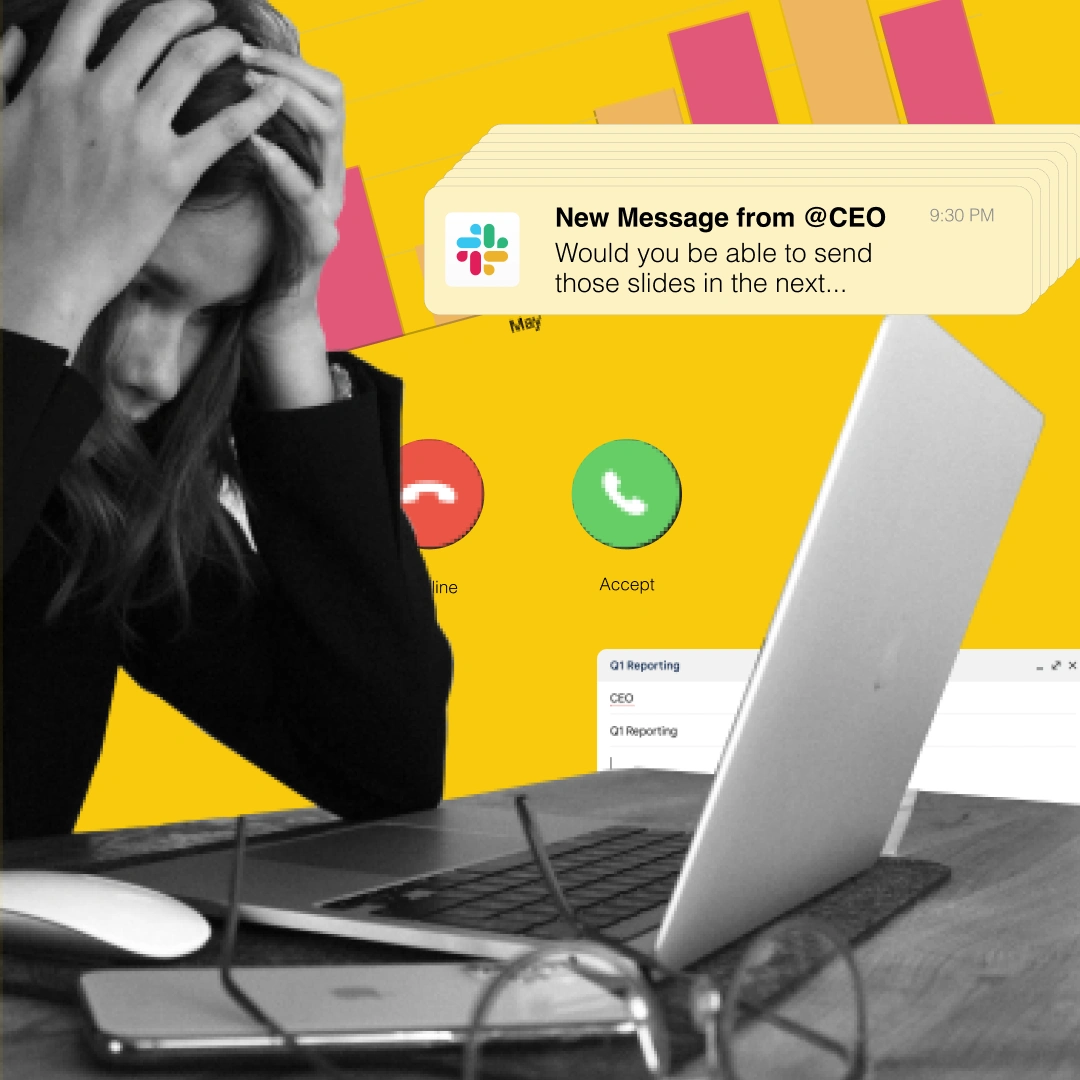The 24-Hour Work Cycle: Navigating “Always on” Culture

In September 2022, we hosted our annual Worklife Next Summit. This day-long event welcomed entrepreneurs, tech founders, and creatives to conversations surrounding tech and the future of work. In this session, Editor-In-Chief of Entrepreneur Magazine, Jason Pfeiffer, speaks with Sarah Manning, Chief People Officer at Hopin, Devin Patel, CEO and founder of Gatho, and Claire Doody, founder of Work in Motion. They talk about ‘always on’ culture and ways they are helping others mitigate its impact on the workforce.
Welcome to the age of always on culture, where the lines between work and leisure time are blurrier than ever!
But what is the always on culture definition? Simply put, it's the expectation that we're always available and reachable, no matter the time or place.
In today's hyper-connected world, technology has made it easier than ever to stay connected to our jobs, even when we don't necessarily want to be. Whether it's a quick email check during a family dinner or a Zoom call during a vacation, the expectation that we're always available and ready to work is becoming the norm, and it’s only expected to get more intense in 2023.
With recent layoffs at some of the biggest tech companies in the world, it’s no secret that the remaining employees are feeling the pressure to do more with less. In fact, Salesforce’s Marc Benioff is questioning productivity rates – or lack thereof – as it relates to their remote work culture:
“New employees are especially facing much lower productivity. Is this a reflection of our office policy? Are we not building tribal knowledge with new employees without an office culture?...Do managers focus enough time and energy on onboarding new employees and achieving productivity?”
These are the questions leaders will be asking their teams as they re-examine the pros and cons of remote work.
The positives of an always on culture were clear during the pandemic:
increased productivity
faster communication
the ability to work from anywhere
But as the dust settles, CEOs are thinking twice about making it a permanent option. Is onboarding remotely as effective? Would a hybrid approach improve productivity? Does a “work from anywhere” attitude distract from being present during working hours?
In the meantime, employees and managers are having to navigate the need to do more with less – which has led to an even stronger 24-hour work cycle. Leaders will face a new challenge of protecting workers’ work-life balance, while pushing for productivity and responsiveness. And workers will have to get a lot more serious about making sure they’re hitting business objectives and getting results.
Let’s hear what the operators have to say about all of this upheaval and ways to navigate the 24-hour work cycle.
Meet the Always on Work Culture Experts
In this Worklife Next Summit session, we got to hear from people pros and founders of companies dedicated to helping build the future of remote work culture.
Before we jump in, let's meet the experts.
Sarah Manning, Chief People Officer at Hopin

Sarah Manning, Chief People Officer at Hopin
Meet Sarah Manning, the Chief People Officer at audience engagement platform Hopin. Sarah is a seasoned HR professional who brings a wealth of experience to her role at the cutting-edge virtual event platform. She's a leader who understands the importance of creating a positive work culture and fostering a sense of community, even when you're working remotely.
At Hopin, Sarah leads a global team focusing on recruiting, people operations, rewards, and the overall employee experience. With Hopin's innovative platform, Sarah has the opportunity to shape the future of work culture and help businesses thrive in a digital age–which made her the perfect panelist for this conversation!
"We're a fully remote business distributed across 30+ countries," says Sarah. "So if you are thinking of this [always-on culture] as a challenge, it sure is. It's top of mind for me on a daily basis, both personally as well as in my job leading the people team."
Devin Patel, CEO and Founder of Gatho

Devin Patel, CEO and Founder of Gatho
Meet Devin Patel, the founder and CEO of Gatho. Devin entered the tech industry working with companies like LivingSocial, Salesforce, and Passport. When the pandemic sent everyone home from the office, he saw an opportunity: what if he could help bring companies back together through team retreats? What if those retreats were able to support local businesses in the cities they visit?
With Gatho, Devin set his sights on revolutionizing the way remote teams stay connected. Gatho is a platform that helps companies that have gone fully remote get back together in person for an off-site event or retreat. They help companies get familiar with their city and host fun, affordable off-site events that incorporate local businesses to help business communities work together. They've streamlined the entire planning process with the company's intention in mind and automated the entire process.
Devin's experience in the tech industry and his passion for building a better way to work remotely make him the perfect leader for Gatho.
"We're just starting out. Like any small-scale company, you're going to be working a lot in this blend of a 24-hour work week. It's kind of what you have to do to get the job done," says Devin. "And so we set very core expectations."
Claire Doody, Founder of Work in Motion

Claire Doody, Founder of Work in Motion
Meet Claire Doody, the founder of Work in Motion. Claire is a seasoned leader with a wealth of experience in shaping the way we work. As the former Global Director of How We Work at Twitter, she has a unique understanding of the challenges and opportunities that come with driving positive change in work culture on a global scale.
With Work in Motion, Claire is on a mission to help organizations navigate the rapidly changing world of work. Her consultancy offers Masterminds, thought partnerships, and consulting to leaders who are committed to improving their work environments.
Claire's experience in shaping the way we work and her passion for coaching leaders make her the perfect person to lead Work in Motion and speak on our panel!
Let's dive in and hear what these remarkable leaders had to say!
What Drives ‘Always-On’ Culture?
When Samuel Morris commercialized the telegraph, information could move faster than a horse could run for the first time. Then, someone stood up at his retirement and chastised him for changing work forever. No longer could someone leave behind and go home, because now there was a telegraph, and information could come right to their home anytime, calling them back to work.
And we've been dealing with that reality ever since.
Even though technology and work have changed significantly since the 1800s, the 24-hour work cycle has been a longstanding conundrum that companies promoting work-life balance and positive remote work culture have been battling for years.
On one hand, always-on work culture can translate to significant benefits for the business. With constant access to work-related information and tools, they can tackle tasks and projects whenever inspiration strikes, rather than being limited by traditional work hours. In addition, team members can stay in touch with one another and collaborate on projects in real time, regardless of where they are located or what time it is.
On the other hand, an always-on culture can make it difficult for employees to disconnect from work, leading to employee burnout, stress, and other negative health effects. Constant access to work-related information and tools can make it hard to switch off and relax, leading to feelings of anxiety and pressure. It can also cause employees to feel compelled to constantly check their emails and messages, which can significantly distract them from their work. This can ultimately lead to lower productivity, increased absenteeism, and staff turnover.
On a smaller scale, we also see this happen with content creators trying to build up multiple streams of income or trying to start a side hustle while working full-time.
So what exactly is driving this shift toward a culture of constant connectivity? We're already well aware of a few key factors:
Technology provides more ways to stay connected to the office.
The rise of the gig economy and flexible work eliminated the traditional 9-5 workday.
Fear of missing out (FOMO) keeps us from wanting to disconnect.
More pressure to be productive.
The list goes on. But the greatest culprit? Remote work.
Remote Work Never Stops
And our speakers agree.
Technology has played a major role in making this shift possible, as the world continues to embrace the remote or hybrid workplace as a way of life. From video conferencing tools to collaboration platforms, technology has allowed us to stay connected and productive from anywhere. But as we all know, with great power comes great responsibility. And for many of us, the line between work and personal time has blurred.
"It's the fallout of the pandemic. Even people who aren't fully remote like we are but are working in a hybrid environment - they're working from home. It's hard to have those boundaries and figure out where those lines are," says Sarah. "You have your phone, your laptop - these movable workspaces mean you're bringing your notifications everywhere you go."
There's nothing like getting a Slack notification at 11:00 PM as you're heading to bed to keep you up for an extra two hours.
At Worklife, we love the hustle of startup culture as much as the next person – it’s necessary for success in today’s world. But we also love balance.
Being always on means we're constantly bombarded with notifications and messages, which can lead to distractions and a fragmented attention span. This can make it hard to focus on one task for an extended period of time, and can lead to increased stress and anxiety.
Continuous access to work means no clear separation between work and personal life, which can lead to neglecting personal and leisure activities, relationships, and overall well-being.
"It's real, and it affects your health – not just turnover, churn, and retention," she adds. "Sure, people get burned out, but it's also genuinely impacting people's health."
Turning Off the Always-On Culture
When you're building a startup or working as a creative entrepreneur, your work is never truly finished. There's always something to be done, whether developing a new product, working on a pitch deck, or brainstorming new ideas. The constant pressure to succeed can make it difficult to switch off from work and enjoy other aspects of life.
But here's the thing: It doesn't have to be this way. Just because we have the technology to be always on doesn't mean we have to use it that way. In fact, turning off the always-on culture can lead to better focus, productivity, and overall well-being.
As leaders, it's our responsibility to promote a remote company culture that encourages clear boundaries between work and personal life, while still pushing workers to bring their best, most productive selves to work when they are online.
We asked Sarah, Devin, and Claire for their take on how to disconnect from an always-on culture.
Leading by Example
"A lot of this comes down to leadership, where people on a team are taking signals and expectations from how their leaders are presenting and reaching out to them throughout the day," says Jason.
Some leaders don't realize the impact their behavior has on their team. By sending a Slack message after hours or asking for a project update via text, they're signaling to workers that they should be available at all hours – not just during the workday.
Leaders and managers can play a crucial role in setting boundaries by leading by example and promoting a culture of disconnecting. They can also be mindful of their own behavior and avoid sending emails or messages outside of working hours. To Benioff’s point, leaders and managers will need to be especially mindful in the onboarding process to emphasize the importance of productivity when people are at work to avoid the need for after hours check-ins or scrambling to get something done.
“Sorry for the slow reply” is a symptom of unrealistic demands in an always-on culture.If you didn’t commit to a response deadline, stop apologizing and drop the guilt—you’re not late.A healthier message is gratitude for reasonable expectations: “Thanks for your patience.”
From Devin's perspective, leadership's impact revolves around trust and setting expectations.
"If you have trust within your team and you've set the correct expectations, I think that resonates among your employees and anyone that works with your company," he says. "At my company, we're pre-seed. My founder and I are building in remote, so we have set core expectations."
Even though the company may find themselves working extra hours to get the job done, Devin's team makes sure they dedicate at least one day of reset time. They also make sure they hold each other accountable for taking care of themselves.
"If someone hasn't done something regarding their health and wellness, like going for a run or working out, we make sure we prioritize the day to allow for that time," he adds.
And Claire agrees. "It's all about making sure that everyone's expectations are set, and that boundaries are being respected, and that we're utilizing the tools available to set those."
For example, Devin's team uses a "Do Not Disturb" status on their communication platform to let team members know when they're head-down on a project.
It's up to leadership to identify opportunities for teams to set clear boundaries on work and communication within the company.
Change the Culture
For Claire, it's all about culture – which can be driven by top leadership but needs to be carried out by every manager and team member. It's no secret how company culture affects productivity.
"Somehow [culture of performance] has become equated with perfection, and we see people wanting to be always on," she says. "There's a pull to demonstrate that they're being confident or really engaged in their work, or there's a fear of missing out on being part of a decision."
When Claire was at Twitter, they took a closer look at the key departments that may be falling into this mindset. They saw that departments like internal communications, executive assistants, and training and development, being the ones in control of scheduling, could be most impacted by the always-on culture.
"A company needs to set expectations that it's not what's healthy," Sarah adds. "We [at Hopin] prioritize impact. It's not simply about being online or showing that you're online – it's actually about the work output."
Jason asked, "How do you ensure it seeps down into the culture at the individual level, not just leadership?"
Claire recommends leaders look systematically across the organization and ask some questions:
What is your performance measurement system?
What are people getting promoted for?
Where does this policy allow people to not show up?
Leaders will need to take the lead on setting up communication protocols, promoting a healthy work-life balance, and embracing flexible working hours to give team members their days back.
Workplaces that focus on what teams are accomplishing, instead of how long they are working, will be the key to finding an accurate measurement of whether remote work is as productive as in-office work.
Embrace Clear Communication & Asynchronous Work
Asynchronous work was another favorite solution among the experts.
Allowing employees to complete tasks and communicate with each other at different times reduces the pressure to always be connected and allows for more flexibility in terms of work schedules.
"For example, writing more often and having my systems and tools in place that support the idea that I can be in Dublin, Ireland, and I can put down my work, and somebody else can pick it up at a later stage," shares Claire.
Not being always-on is also hugely beneficial for you and your team. Being able to be asynchronous is important for a remote company, if you're always around then that's not async. You also help others to grow by them not being dependant on your presence 👌
Remember, this does require a mindset shift away from performance or perfection culture and toward measuring impact.
Asynchronous work can feel like you're letting your workforce loose to do whatever they want, whenever they want. And technically, that's the case. But as long as there are clear protocols and guidelines on communicating and tracking progress asynchronously, it can be successful.
"Team working agreements are a really, really helpful way of operating at a team level," says Claire. One way to set clear boundaries is by establishing clear communication protocols and guidelines for when employees should be available and responsive. This can help set expectations for when employees should be disconnected and not expected to respond to work-related tasks.
Consider zeroing in on the following norms:
Expected response time based on the communication platform
What kind of communication is acceptable through Slack?
What should be saved for email or a project management tool?
Who needs to be present in meetings?
Does everyone need to use their video on calls?
📧 just a reminder to anyone doing a little work this weekend: if you click the arrow on the @gmail "Send" button, you can still write your email BUT schedule it to be sent on Monday morning (!) instead of contributing to an always-on workplace culture. pic.twitter.com/qmuzRZROXC
Devin adds that clear written communication is key here too. "I want to underline how important writing has become in a remote-first world. I think we're even going to start to see classes written on how to communicate properly in a remote-first environment."
He also notes that voice memos are a great way to avoid losing out on context in written form. (We've all read a short and direct email that comes across as rude.)
Asynchronous also allows workers to set their own schedules and choose what time of day they work best. This leads us to our next solution discussion: embracing flexibility.
Lean into the Flexibility
A flexible work schedule allows remote workers to take control of their time and prioritize the things that matter most to them. Whether it's spending more time with family, taking a yoga class, or simply having a leisurely lunch, a flexible schedule allows you to fit work around your life–instead of the other way around.
To make the most of a flexible schedule, it's important to set clear boundaries and stick to them. Want a 4-day work week? Do it! Make sure you set specific times when you will and will not be available to work, and communicate those boundaries to your colleagues and clients.
"I know I will work late in the evenings, because I work a lot with the U.S. team," says Sarah. "For me to actually get quality meeting face-time in, I know I'm going to have to work into my evenings. So if you want to work late, that's okay. But make sure you're taking your morning to go to the gym, grocery shopping, or whatever you need to maintain balance."
The single more important question for remote culture is are you a morning bird or a night owl?
One way to create boundaries is to set a "workday" schedule that starts and ends at the same time each day. This helps to develop a sense of routine and discipline, and ensures that you're not working longer hours than necessary. You can also set aside specific times during the day to check and respond to emails or take care of other work-related tasks. Again, this helps prevent work from creeping into your personal time.
Training for Managers
So how can leaders make sure this is filtering down into the organization? Through the managers–but with the proper support.
"I think we really need to acknowledge that it's never been harder to manage a team," says Claire.
The pandemic and remote work have presented a new suite of challenges that managers must navigate. It will be critically important to support them in learning to embrace an entirely new management style.
"Your manager is the most influential person in your day-to-day, and that doesn't change with the dynamics of being remote or working hybrid," says Sarah. "And I think it's often said you don't leave jobs, you leave managers. So it's hugely important for companies to invest in their managers."
Managers should be up-skilled in leading the charge of asynchronous protocol, expanding their emotional intelligence, and recognizing and mitigating any work-life balance issues on their team.
Advice for Preventing Always-On Burnout
We could have talked about the 24-hour work cycle for 24 more hours, but we only had 30 minutes.
To wrap things up, Jason asked our panelists: Could you offer one thing that somebody should be thinking about right now to address whatever problem they're seeing in their work related to burnout from always-on culture?
Lean into Empathy
Sarah says a great place to start is by looking at the culture and seeing where empathy fits into the picture.
"As much as I can say prioritize impact and ask if we're recognizing or rewarding for performance, it really is about 'do you care about your colleagues?'" she adds. "In a hyper growth startup, everybody is working, so we need to care about each other at the same time."
Building up the emotional intelligence of the leadership team will enable them to build trust and be the driving force of a healthy remote work culture.
Keep it In Conversation
For Claire, it starts with a conversation. And many conversations after that.
"I would have a conversation about rest and work. Have loads of conversations about it and crowd source from your people," she says. It's critical to remind your team that the work is important, but if we work too hard, we will burn out.
Set Expectations & Check on Them Routinely
"I'll reiterate trust and expectations," says Devin. "I'll also add that routines are so important. If you bake into your routine for yourself or your team that health and wellness are priorities, you can ensure everyone is well rested."
If your managers are taught to routinely check in on the health and wellness of their employees and make sure they're resting enough, employees will recognize that the company cares about them. When teams work really hard on a sprint, make sure they take time off afterwards.
Embrace the 24-Hour Work Cycle Without Being Always On
When it comes to remote work, the 24-hour cycle can feel like a never-ending cycle of being "on" and tied to our notifications. But with a little bit of reimagining work, it is possible to make the most of the remote work lifestyle without burning out. You can still work outside the typical 9-5 workday, but still pack up your work and walk away between the work hours you set for yourself.
Just remember the tips from our panelists:
Lead by example
Embrace an asynchronous work culture
Create and communicate clear boundaries and protocols
Keep work-life balance part of the conversation
As we continue to see another shift in remote work culture while leaders re-examine productivity, workers will need to get serious about making the most of their working hours. We can expect CEOs like Marc Benioff to keep asking the hard questions and making even harder decisions about the future of work. In the meantime, we’ll be keeping an eye on the workforce headlines and trends in remote work.
Was this article helpful? You might also want to check out:
Like this project
Posted Jun 15, 2023
Part of a series of articles recapping sessions from the Worklife Summit.
Likes
0
Views
10





